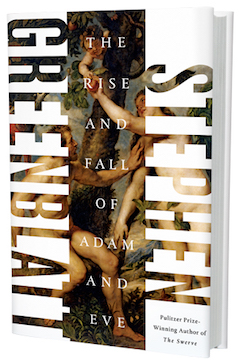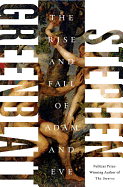The Rise and Fall of Adam and Eve
by Stephen Greenblatt
The Rise and Fall of Adam and Eve is Stephen Greenblatt's eagerly anticipated follow-up to 2012's Pulitzer Prize- and National Book Award-winning The Swerve, a modern classic that showed how an ancient text by Lucretius helped spark the Renaissance. In his new book, Greenblatt focuses on a much older work of literature: the story of Adam and Eve. Greenblatt is clear-eyed about the ways relatively recent scientific discoveries have for many displaced the long-dominant origin story, but he has "come to understand that the term 'lie' is a woefully inadequate description of either the motive or the content of these stories, even at their most fantastical." With respect and erudition, Greenblatt resolves to tell the "life history of one of the most extraordinary stories ever told."
Greenblatt begins with the event that he believes shaped the creation of the famous origin story, what is often referred to as the Babylonian Captivity. In 597 BCE, the Babylonian Empire conquered Judah and deported many Hebrews to Babylon. Dwelling in the opulent, cosmopolitan capital far from home, the Hebrews' belief in Yahweh was challenged by their dispiriting circumstances as well as competing theologies. Greenblatt sympathetically reconstructs the spiritual despair resulting from what must have felt like Yahweh's decisive defeat at the hands of the Babylonian god Marduk.
After the Babylonian Empire collapsed, Hebrews returned to Jerusalem determined to create a sacred text that would define their beliefs and establish an origin story as powerful as that found in the Babylonian Enuma Elish. So, in the fifth century BCE, Hebrews wrote or compiled the Torah, including an origin story that firmly established humanity's true parentage. The story asserted Yahweh's dominance, as well as a simpler version of events that was not, as in so many other origin stories, "a tangle of incest, conspiracy, and intergenerational bloodletting." However, without the competing gods and goddesses common to polytheistic religions, the Adam and Eve story created knotty theological questions that people of multiple faiths would argue over for centuries to come.
After establishing the origins of the Western world's most impactful origin story, Greenblatt examines the diverse ways the story has been interpreted over time. The strangeness and relative vagueness of the Adam and Eve story initially led to one popular approach: allegory. An allegorical interpretation helped to make sense of many of the story's strange details and seeming inconsistencies, but it did not satisfy the biblical literalists who would find their greatest champion in the Christian philosopher Augustine of Hippo.
Greenblatt's book focuses on a few great thinkers, many of whom, like Augustine, believed that Adam and Eve were humankind's literal ancestors. Many modern readers might be tempted to chalk that belief up to ignorance, but Greenblatt shows how it had much more to do with the peculiar history of Christianity and the influence of idiosyncratic artists, writers and philosophers like Augustine, Albrecht Dürer and John Milton. Greenblatt demonstrates how their contributions changed popular perceptions of Adam and Eve, but he also digs into each individual's biography in order to explain why literal interpretations of the bible were so attractive to them. In Greenblatt's telling, religious beliefs are often shaped at least as much by personal experience, personality quirks and deep-seated psychological issues as they are by intellectual rigor.
The need to justify the story of Adam and Eve, to account for its literal truth, led intelligent people to seemingly bizarre conclusions. For Augustine, Adam and Eve eating the apple from the tree of the knowledge of good and evil was the source of Original Sin and justified "all the miseries that have followed." Many subsequent Christians were happy to assign all the blame for the Fall to Eve, providing a theological basis for centuries of misogyny. Greenblatt is careful to point out, however, that even dominant interpretations were never the only interpretations. Artists like Dürer pushed back against ascetic tradition by depicting the beauty of Adam and Eve's naked bodies without shame. In order for Milton to make sense of Adam and Eve as people, he gave them complex inner lives in Paradise Lost, enriching the traditional story with a kind of psychological realism. He also brought infamy on himself by using the story of Adam and Eve to advocate for no-fault divorce in 17th-century England.
Greenblatt excels at showing how a seemingly simple story could inspire ideas that were frequently at odds with each other, or even with their author's own purposes. For example, Greenblatt writes that, despite Milton’s intentions, "by the close of Paradise Lost, Adam and Eve had become so real... that they began to crack open the whole theological apparatus that brought them into being." Greenblatt follows those cracks as philosophers and scientists push them ever wider, through Darwin and on to the present day, where, in a moving final chapter, Greenblatt relates how chimpanzees "enable us to see for ourselves what it would have been like to live without knowledge of good and evil, just as they live without shame and without understanding that they are destined to die. They are still in Paradise."
The Rise and Fall of Adam and Eve seeks to remind us why the story of Adam and Eve had such a powerful impact on Western culture, and even resurrects the story's value for present-day readers without the same theological inclinations. Greenblatt makes a convincing case for the story's value as great literature, and for his own gifts as an intellectual historian. --Hank Stephenson







_Stephanie_Mitchell_[slash]_Harvard_University_300dpi.jpg)